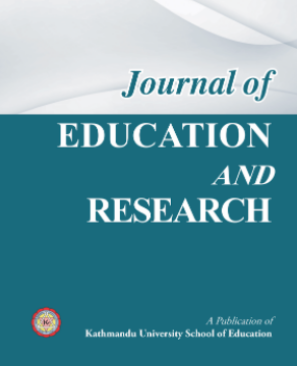
Non-Formal Vocational Education for Pineapple Farmers: Promoting ‘Relevance’ of Education to Rural Economy
Original Article
Journal of Education and Research, Volume 6, Issue 2, 2016, 27-42, https://doi.org/10.3126/jer.v6i2.22147
Publication date: Aug 15, 2016
Views: 479 | Downloads: 258
How to cite this article
APA
In-text citation: (Suebnusorn, 2016)
Reference: Suebnusorn, W. (2016). Non-Formal Vocational Education for Pineapple Farmers: Promoting ‘Relevance’ of Education to Rural Economy. Journal of Education and Research, 6(2), 27-42. https://doi.org/10.3126/jer.v6i2.22147
Reference: Suebnusorn, W. (2016). Non-Formal Vocational Education for Pineapple Farmers: Promoting ‘Relevance’ of Education to Rural Economy. Journal of Education and Research, 6(2), 27-42. https://doi.org/10.3126/jer.v6i2.22147
Vancouver
In-text citation: (1), (2), (3), etc.
Reference: Suebnusorn W. Non-Formal Vocational Education for Pineapple Farmers: Promoting ‘Relevance’ of Education to Rural Economy. Journal of Education and Research. 2016;6(2):27-42. https://doi.org/10.3126/jer.v6i2.22147
Reference: Suebnusorn W. Non-Formal Vocational Education for Pineapple Farmers: Promoting ‘Relevance’ of Education to Rural Economy. Journal of Education and Research. 2016;6(2):27-42. https://doi.org/10.3126/jer.v6i2.22147
AMA
In-text citation: (1), (2), (3), etc.
Reference: Suebnusorn W. Non-Formal Vocational Education for Pineapple Farmers: Promoting ‘Relevance’ of Education to Rural Economy. Journal of Education and Research. 2016;6(2), 27-42. https://doi.org/10.3126/jer.v6i2.22147
Reference: Suebnusorn W. Non-Formal Vocational Education for Pineapple Farmers: Promoting ‘Relevance’ of Education to Rural Economy. Journal of Education and Research. 2016;6(2), 27-42. https://doi.org/10.3126/jer.v6i2.22147
Chicago
In-text citation: (Suebnusorn, 2016)
Reference: Suebnusorn, Wanwisa. "Non-Formal Vocational Education for Pineapple Farmers: Promoting ‘Relevance’ of Education to Rural Economy". Journal of Education and Research 2016 6 no. 2 (2016): 27-42. https://doi.org/10.3126/jer.v6i2.22147
Reference: Suebnusorn, Wanwisa. "Non-Formal Vocational Education for Pineapple Farmers: Promoting ‘Relevance’ of Education to Rural Economy". Journal of Education and Research 2016 6 no. 2 (2016): 27-42. https://doi.org/10.3126/jer.v6i2.22147
Harvard
In-text citation: (Suebnusorn, 2016)
Reference: Suebnusorn, W. (2016). Non-Formal Vocational Education for Pineapple Farmers: Promoting ‘Relevance’ of Education to Rural Economy. Journal of Education and Research, 6(2), pp. 27-42. https://doi.org/10.3126/jer.v6i2.22147
Reference: Suebnusorn, W. (2016). Non-Formal Vocational Education for Pineapple Farmers: Promoting ‘Relevance’ of Education to Rural Economy. Journal of Education and Research, 6(2), pp. 27-42. https://doi.org/10.3126/jer.v6i2.22147
MLA
In-text citation: (Suebnusorn, 2016)
Reference: Suebnusorn, Wanwisa "Non-Formal Vocational Education for Pineapple Farmers: Promoting ‘Relevance’ of Education to Rural Economy". Journal of Education and Research, vol. 6, no. 2, 2016, pp. 27-42. https://doi.org/10.3126/jer.v6i2.22147
Reference: Suebnusorn, Wanwisa "Non-Formal Vocational Education for Pineapple Farmers: Promoting ‘Relevance’ of Education to Rural Economy". Journal of Education and Research, vol. 6, no. 2, 2016, pp. 27-42. https://doi.org/10.3126/jer.v6i2.22147
ABSTRACT
Canned-pineapple is one of the most important exports of Thailand. Unfortunately, the more pineapples the farmers cultivate, the more they are likely to fall into debt and become poorer. Therefore, in 2011, the Phetchaburi College of Agriculture and Technology in collaboration with Kuiburi Fruit Canning Company Limited initiated a non-formal vocational education program tailored to the pineapple farmers who were normally in the age between 40 and 60. The primary aims of the program were to build trust between the farmers and the factories and to equip the farmers with necessary skills for pineapple planting as per the demands of the pineapple-processing factories. Through field visits, semi-structured interviews, and a focus-group interview with the stakeholders, this study sheds lights on the relevance of education to the demands of rural economy which transcends the traditional preparation of employees for rural economic sectors. The well-educated farmers who understand their roles in the farming stage of the food industry’s value chain are as important as formal workers or employees in the breeding, the post-harvest, the production process, as well as the marketing and logistics stages of the value chain. Therefore, non-formal vocational education for the rural labour market should by no means be confined to formal workers in the downstream of the value chain. Informal workers or farmers in the upstream of the value chain have crucial impact on its subsequent stages. Above all, being empowered by relevant non-formal vocational education, the roles of farmers in advancement of rural economy should be extended beyond farming.
REFERENCES
---
LICENSE
This work is licensed under a Creative Commons Attribution 4.0 International License.
